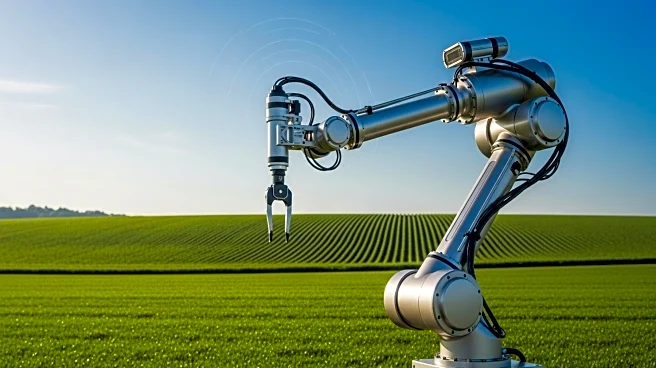What's Happening?
The agriculture automation systems industry in the United States is experiencing significant growth, driven by advancements in precision agriculture technologies. The market, valued at $4.3 billion in 2022, is projected to reach $6.69 billion by 2031, with a compound annual growth rate (CAGR) of 5.71% from 2024 to 2031. Recent developments include the establishment of the first large automated hydroponic farm in the capital, showcasing the integration of IoT and AI-driven solutions for smart irrigation, pest management, and crop monitoring. The FIRA USA event in Fresno, California, highlighted autonomous systems and robots for growers, emphasizing the role of robotics in enhancing agricultural productivity. Companies like Syngenta and John Deere are leading the charge with AI-driven farming solutions and autonomous tractors, respectively, reflecting the industry's shift towards automation and data-driven decision-making.
Why It's Important?
The growth of agriculture automation systems is crucial for the U.S. agricultural sector, as it addresses challenges such as labor shortages, resource optimization, and sustainability. By adopting advanced technologies, farmers can improve yields, reduce costs, and enhance environmental stewardship. The integration of AI and IoT in farming practices allows for precise monitoring and management, leading to better resource utilization and reduced waste. This shift not only benefits farmers but also contributes to food security and the economy by increasing efficiency and productivity. As the industry evolves, stakeholders including technology providers, farmers, and investors stand to gain from the emerging opportunities in precision agriculture.
What's Next?
The agriculture automation systems market is poised for continued expansion, with strategic initiatives by leading players expected to accelerate adoption. Upcoming events like FIRA USA 2025 will showcase new technologies, including autonomous tractors and AI-driven solutions, further driving innovation in the sector. Companies are likely to focus on integrating more advanced robotics and AI technologies to enhance farm operations. Additionally, the market may see increased consolidation among control system integrators and AI ag-tech startups, leading to more comprehensive solutions and competitive offerings. As these technologies become more accessible, the adoption rate among farmers is expected to rise, paving the way for a more sustainable and efficient agricultural industry.
Beyond the Headlines
The rise of agriculture automation systems also presents ethical and cultural implications, particularly concerning the displacement of traditional farming practices and labor. As automation becomes more prevalent, there may be concerns about job losses in rural communities and the need for retraining programs to equip workers with new skills. Furthermore, the reliance on technology raises questions about data privacy and security, as farms increasingly depend on digital platforms for operations. Addressing these issues will be essential to ensure that the benefits of automation are equitably distributed and that the transition to high-tech farming is smooth and inclusive.









